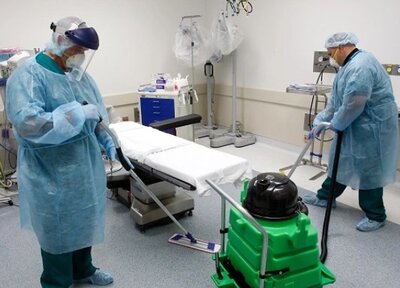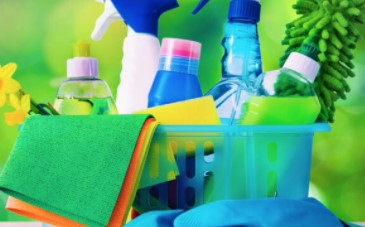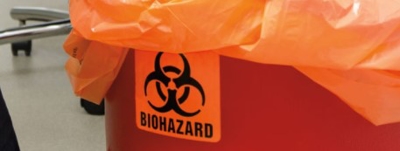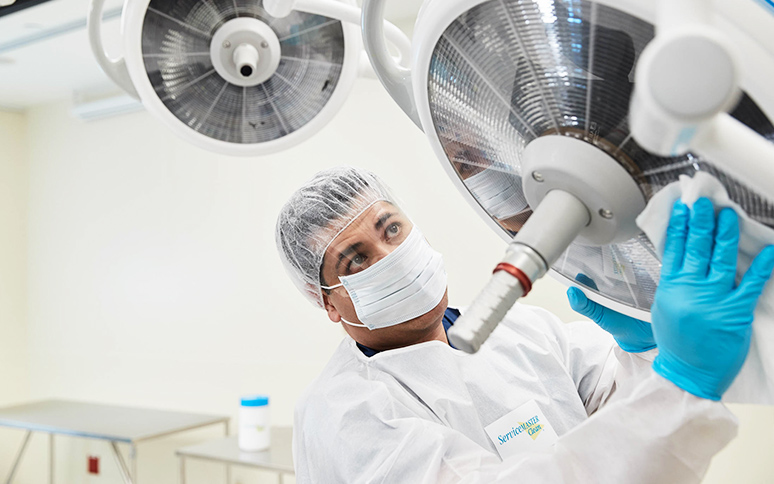Ways to Reduce Healthcare Workers' Exposure to Airborne Illnesses
While healthcare workers are exposed to an array of job-related hazards, exposure to a variety of airborne illnesses is a major source of concern. Since healthcare workers regularly care for patients who may carry different types of airborne illnesses, extra precautions should be taken to ensure that these illnesses are controlled. Use these tips from ServiceMaster Clean to find out how you can reduce healthcare workers’ exposure to airborne illnesses in your facility.
Common Airborne Infectious Illnesses
Infectious airborne illnesses can be caused by organisms such as fungi, parasites, bacteria, or viruses. Some forms of infectious airborne illnesses may be more prevalent during certain seasons of the year, such as the influenza virus. Unlike pathogens such as HIV, Hepatitis B, and Hepatitis C which are transferred through blood or bodily fluid exposure, airborne illnesses are caused by pathogenic microbes that are transmitted through an infected individual's sneezing or coughing.
Common non-seasonal forms of infectious airborne illnesses may include:
- Chickenpox
- Measles
- Tuberculosis
- Influenza
- Rhinovirus (common cold)
- Methicillin-resistant Staphylococcus aureus (MSRA) infections
- Some gastrointestinal viruses
- Disseminated herpes zoster
Basic Precautions Against Airborne Illnesses
There are basic precautions healthcare workers should take on a regular basis to reduce the likelihood of exposure to airborne illnesses. Healthcare employers should:
- Make the annual flu vaccination available to all healthcare employees.
- Encourage staff to stay at home if they're sick.
- Develop a policy for sick workers.
- Enforce proper hand hygiene before and after a healthcare worker assists a patient.
- Provide the necessary personal protective equipment (PPE) such as gowns, gloves, respirators, and surgical masks and ensure that workers understand how to use and discard the equipment properly.
- Limit how many healthcare workers care for patients who have influenza.
- Have access to disposable paper towels, hand sanitizer, and soap and water at all times.
What to Do When Airborne Illnesses Are in Your Facility
If you're caring for a patient with a suspected infection that can be transmitted by an airborne route, don't put your employees at unnecessary risk. Adhere to the Centers for Disease Control and Prevention's "Guideline for Isolation Precautions" and take the following actions:
- Place the patient in an appropriate airborne infection isolation room (AIIR).
- If you are unable to place the patient into an AIIR-approved room, put the patient in a single-patient room, away from other patients if possible.
- Restrict access to the room, and post signs to alert others about the risk of airborne infection.
- Advise your staff to wear PPE appropriately, including gowns, gloves, and face masks, during each interaction with the patient. Properly dispose each item before leaving the room.
- Unless absolutely necessary, refrain from transporting the patient, and clean all equipment after use.
Thoroughly cleaning and disinfecting the patient's room can help limit exposure to airborne illnesses. If you need professionals to come in and properly disinfect all areas of your facility, call the experts at ServiceMaster Clean. We can work with you to create a comprehensive cleaning regimen that fits your healthcare facility’s needs. Learn more about our healthcare cleaning services today to start limiting your staff’s risk of exposure to airborne illnesses.









